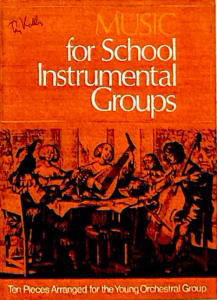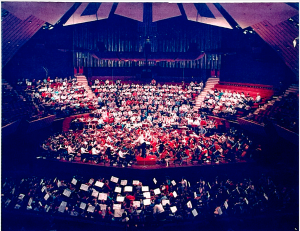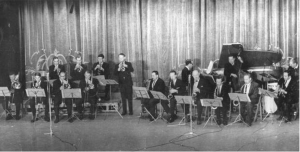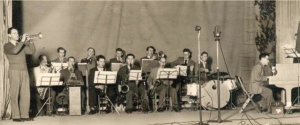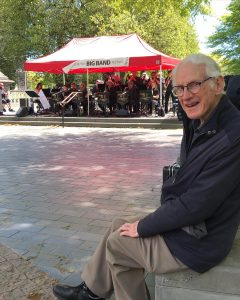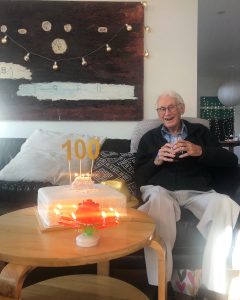A chat with 100 year old Doug Kelly – an influential music educator, musician and arranger with a passion for instrumental and jazz music
Judith Bell
April 2022
Doug Kelly and I sat down for a chat soon after his 100th birthday. Here are some of his memories from his years as a musician and music educator over the last century!
Doug Kelly trained as a primary school teacher in 1940 and his role in education included teaching in schools from 1946 after the war for 20 years and working as a district music advisor for Canterbury for 20 years from 1966. He introduced instrumental music to children, running orchestral and brass music for CSIM for 20 years, initiating, writing for and running the significant instrumental contribution of the Christchurch Schools’ Music Festival and holiday course, writing over 60 arrangements for this from 1972, and writing, arranging and publishing for school-aged orchestras. He organised the national secondary schools’ orchestral holiday course for two years from 1966, and wrote and conducted for massed orchestras and instrumentalists for CSM for the grand finales in 1985 and 1987. He attended ISME in Bristol in 1982 with other music advisors, and helped run the ISME local conference (now MENZA) in Christchurch in 1985.
Alongside his career as a teacher he had a significant performing career. After returning from playing in the RNZAF band during the war, Doug played trumpet in the 13-piece 3YA Radio Broadcasting Band and 9-piece Latimer Dance Hall Band from 1946. Then from 1949 he directed and arranged hundreds of pieces for the weekly 3YA Radio Big Band broadcasts, spanning 40 years. He was also playing trumpet in local orchestras including the Civic, Canterbury and Christchurch Symphony Orchestra, and was still playing trumpet in the Risingholme orchestra as a nonagenarian!
What was music education like when you started teaching and how had it changed by the time you left?
It was just a piano and vocal. There were choirs and whole-school singing. Music education in those days was not to my liking. It was not music education using instruments – I wanted people to learn to play instruments.
Where did you teach?
North New Brighton School, Woolston School, Beckenham School and Linwood Avenue School; the last school I taught at was Heaton Intermediate and I ended as first assistant. I formed a large school orchestra there and wrote arrangements to suit their level of ability, which were performed at various functions and school concerts. Being in charge of a class as well as being in charge of school sport and orchestral music proved very time consuming. Life was also busy with study for music exams [he completed FTCL (performance trumpet), LTCL (The Art of Playing Trumpet), LRSM (teacher of trumpet), AMusTCL (Harmony, Counterpoint, Art of Teaching, Form and History of Music), all gained in 1964 and 1965], while teaching and conducting orchestras at the CSIM Saturday morning classes, Radio Band contracts and with family life at home.
Can you tell me about changing the pitch of the brass instruments so they could be included in other groups and how that affected schools?
I saw the brass instruments start to change from the older higher pitch [from A 452.5 used in brass bands to A440] so that brass players could join other groups of instruments such as the Civic Orchestra. This also influenced the possibility of school orchestras with music in schools.
What do you remember about music in your childhood and youth?
My mother and sister were lovely pianists. We had a simple childhood. All three children in our family were encouraged by our musical mother to sing and perform at the Christchurch City Competitions … It is now unbelievable that at the age of 11, I won the song competition for boys 8 and under 12. But the voice was not my favourite instrument …the feeling inside me was for jazz music.
Why did you choose the trumpet?
My family bought a radio and I heard a beautiful sound and asked what it was. My father said it was a trumpet, and he was able to get one for me to play. [This] really excited me even at that early age. With the valve model radio of those days it was necessary to erect a twenty foot mast with an aerial for the reception of radio programmes. In 1937 the Christchurch Boys High School Band became the start of a dedication to the trumpet and addiction to jazz music. I later joined the first Christchurch jazz club named the “Swing Club”.
Can you think of any major advances that changed how music was performed, taught or learnt in your life?
The Town Hall. It meant that people could hear vocals not just accompanied by a piano, but children were able to hear and play instruments as well to accompany choirs and also play on their own.
[It was Doug’s idea to include an auditioned representative instrumental groups, with massed items especially arranged to the Christchurch Schools’ Music Festival, which up until that point had just had choirs accompanied by piano. This has continued for over 35 years.]
One of my main objectives in establishing the “New Look ” festival concept was to institute the Grand Finale with the full 100 instrumentalists of the representative primary and intermediate Orchestra accompanying the last bracket of massed items. My past experience in writing arrangements enabled me to orchestrate suitable accompaniments so that these items provided a dramatic climax to the concert. At the holiday course, it was my duty to rehearse the orchestra for these items.
[The critic Ian Dando wrote: “The key man in those impressive culminating items for choir and orchestra is undoubtedly Doug Kelly whose deft expertise with arranging has made this bracket possible year after year.”]
Music advisor role
As District Music Advisor I took over from David Sell, the first Canterbury Music advisor. The national music advisor at the time was Bill Walden-Mills.
I was responsible for over 450 schools in the Canterbury Region with schools ranging from Hapuku north of Kaikoura down to Waimate and Glenavy; Barry Town north of Greymouth down to Haast on the the West Coast, and four schools on the Chatham Islands as well as Christchurch, Timaru, Ashburton, Kaiapoi and Rangiora. I was able to travel over in a Bristol freighter aircraft to spend a week in 1984 running a teacher in-service course and visiting those remote schools. The huge hydro-electric schemes in South Canterbury resulted in the development of the largest primary school in New Zealand at Twizel. After 20 years as a lone music advisor in Canterbury, two positions were created and it was pleasing to see Murray Lennox and Russell Kent appointed after I retired.
For the first 10 years of the twenty spent in this role it was my responsibility to organise the annual National Secondary Schools’ Orchestral Holiday Course held in May in Christchurch. Bill Walden-Mills conducted the orchestra and the rehearsal of the woodwind and brass sections, and the conducting of a bracket of items was my job. One year I was sent up to Hamilton to tutor and assist with this course. It was here I met John Emeleus and formed a long-lasting friendship. He became music advisor in Southland, and eventually the principal Lecturer of the music department at Christchurch College of Education.
Right from the start of this new position of music advisor one of my main objectives was to develop and encourage instrumental training in schools. Fortunately this was possible because of generous support from departmental officers, particularly my first liaison inspector Bryon Gainsford. It was possible for me to purchase a large pool of instruments to loan to schools as well as form many out-of-school instrumental classes. It was important to become deeply involved and vigorously support the CSIM (Christchurch School of Instrumental Music) Saturday morning scheme which involved over 1,000 primary and secondary students who were taught in graded classes and also different levels of orchestras. This was indeed a model scheme with progression from pre-school classes and beginners right through to the youth orchestra and senior concert band. Fees for the primary pupil’s classes were paid for by the Canterbury Education Board under the out-of-school classes scheme.
[While conducting and arranging for orchestras 4 and 5 in the early sixties, Doug noticed a lack of young orchestral brass players in the eight orchestras and a lack of boys playing, so Doug was able to introduce brass classes for trumpet, trombone and French horn. Within a few years all orchestras had brass sections, then concert bands and a jazz big band were later formed].
It was an enormous and laborious task for one advisor to maintain such a huge pool of orchestral instruments and be involved in such a large number of instrumental classes at the same time as general advisory work at in-service courses and school visits. There were also many national courses in Wellington and Auckland for music advisors. Music festivals and curriculum committees were another aspect of the job. Normal school holidays were not part of the job.
Among the music advisors from other districts were John Emeleus, Elizabeth Mintz, John Orams and Max Stewart. [John Orams and Doug had a common interest in technology and later in “Sibelius” and he and Doug became good friends].
Nationwide contact was an excellent part of life in the advisory service. Because of my interest in tape recording, much help was provided to classroom teachers through cassette accompaniments for songs and units of work. One important work was the writing of simple classroom music arrangements to involve players at all stages of development. In 1969 AH and AW Reed published my “Music for Classroom Instrumental Groups,” which became useful to many advisors and teachers. In my position I was not able to use my name on the book.
What advice would you pass on to current music teachers and musicians?
To listen and play all kinds of music. Even some of the rubbish.
What are you most proud of?
The influence I had over the years working as a musician, arranger, with musicians and then joining in with the education system. And also being able to influence the use of instruments – the running of the instrumental scheme, being able to hand out instruments for people to learn. I still remember one of the first people coming to me asking for a cello.
Have you travelled anywhere that has influenced your music?
Everywhere you travel you listen to everyone, all musicians. As music advisors we were sent over together as a group to the music education conference in London [ISME]. That was in my last year of being a music advisor. We took individual trips through Europe.
I haven’t travelled much, but have listened to music of all different sounds, particularly the new sounds, the jazz sound. The jazz sounds influenced me more than anything. Music was very serious. But I have found since, that jazz can be serious. All music can be serious. So I more or less concentrated while I was writing, to write with that jazz feeling. Like when I took that radio band it was the first time it played swing, before that it was a dance band. In those days the halls had dances with dance bands. And they played general music and usually in those early days they used stock arrangements – you bought stock arrangements for 3 saxophones, 3 trumpets, 3 rhythm players, usually about 9 players. I broke that pattern when I started writing for more instruments.
Recording techniques
There were no multi-microphone or echo facilities, just one mike in front of the band and there were experiments piping the sound down to the concrete toilets and back again to add an echo effect. As tape recorders were not yet used the broadcasts were direct with no chance of retakes. The theme tune of my programmes was the original composition “I’ll be Thinking of You” played on trumpet with band backing to introduce the “Rhythm Rendezvous” show. When the red light went on we had to perform as if it were a live concert regardless of any mistakes!
The band moved to the main studio and tape recorders made it possible to record one track at a time and dub in the compere later. Echo boxes emerged to take out the dryness of studio sound. …as overdubbing had not been developed the vocalist was shielded behind the doors of the entrance or put in a kind of telephone style box with a microphone so that the band accompaniment could be balanced with her voice.
Gradually the recording techniques became more sophisticated with microphones for each section, then for each instrument controlled by the technician … the programmes were played nationally and some on exchange overseas….
…At first there were 12 players, 3 trumpets, 2 trombones, 4 saxophones and 3 piano, bass and drums, but I soon increased the reed section with the addition of a baritone saxophone to add a deeper note to my scores for a richer sound. …. All music parts were hand written.
[The Doug Kelly Band opened the first Christchurch Jazz Concert on 18th July 1951 with his arrangements of Elevation, I can’t Get Started and How High the Moon].
Recordings and an interview about this concert can be found here:
Tell me about your song “I’ll Be Thinking Of You”
I just wrote a song in my tent during the war. I was writing arrangements for the air force band – a concert band that performed for live programmes.
The song was written for his fiancee, Joy. Some of the air force members heard the melody and liked it, and when Doug got back to NZ he arranged it for the concert band and it was performed often, including on the victory tour of Australia, and published by Beggs. The melody became the opening theme of his Radio Broadcasting Big Band programmes for many years.
In 2020, over 7 decades after it was written, the RNZAF band flew down to Christchurch and performed it especially for Doug.
Doug’s legacy of students and teachers that he has influenced is in the thousands, and his innovations are still seen in the fabric of the Christchurch music scene, both in education and performance. My own musical journey was strongly influenced by his work – I remember his orchestral arrangements making a large impression on me when I got to play in the Christchurch music festival when I was twelve; it made me realise that local people could be arrangers, and I was immediately inspired to start my life-long passion for arranging! Doug’s on-going support of youth jazz in Christchurch has also been notably encouraging in his recent years. Doug’s legacy of working to include instruments, technology, jazz and contemporary styles has benefited an incalculable number of people in musical development, passions, education, friendships and careers thanks to the work of this remarkable centenarian.
By Judith Bell
